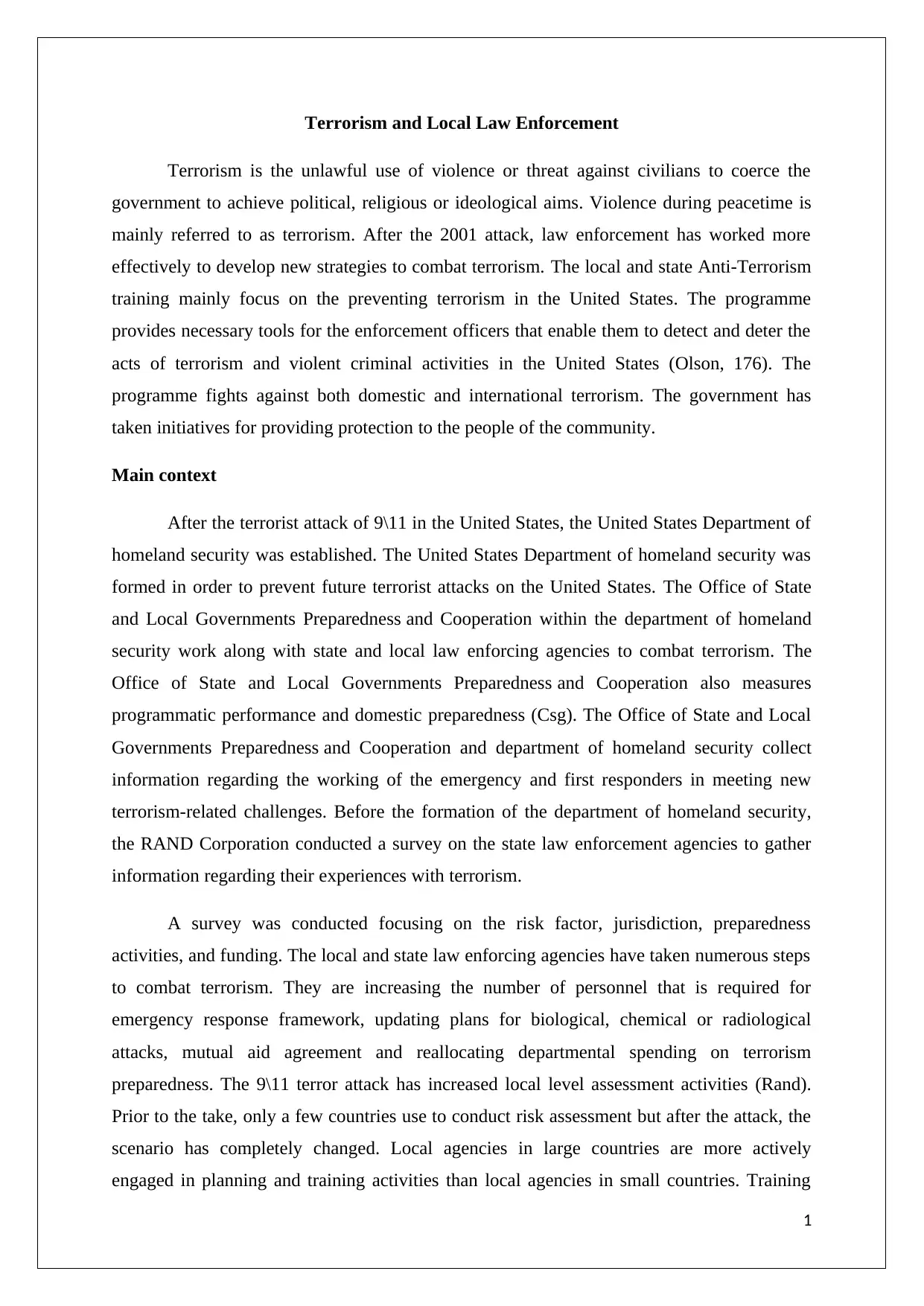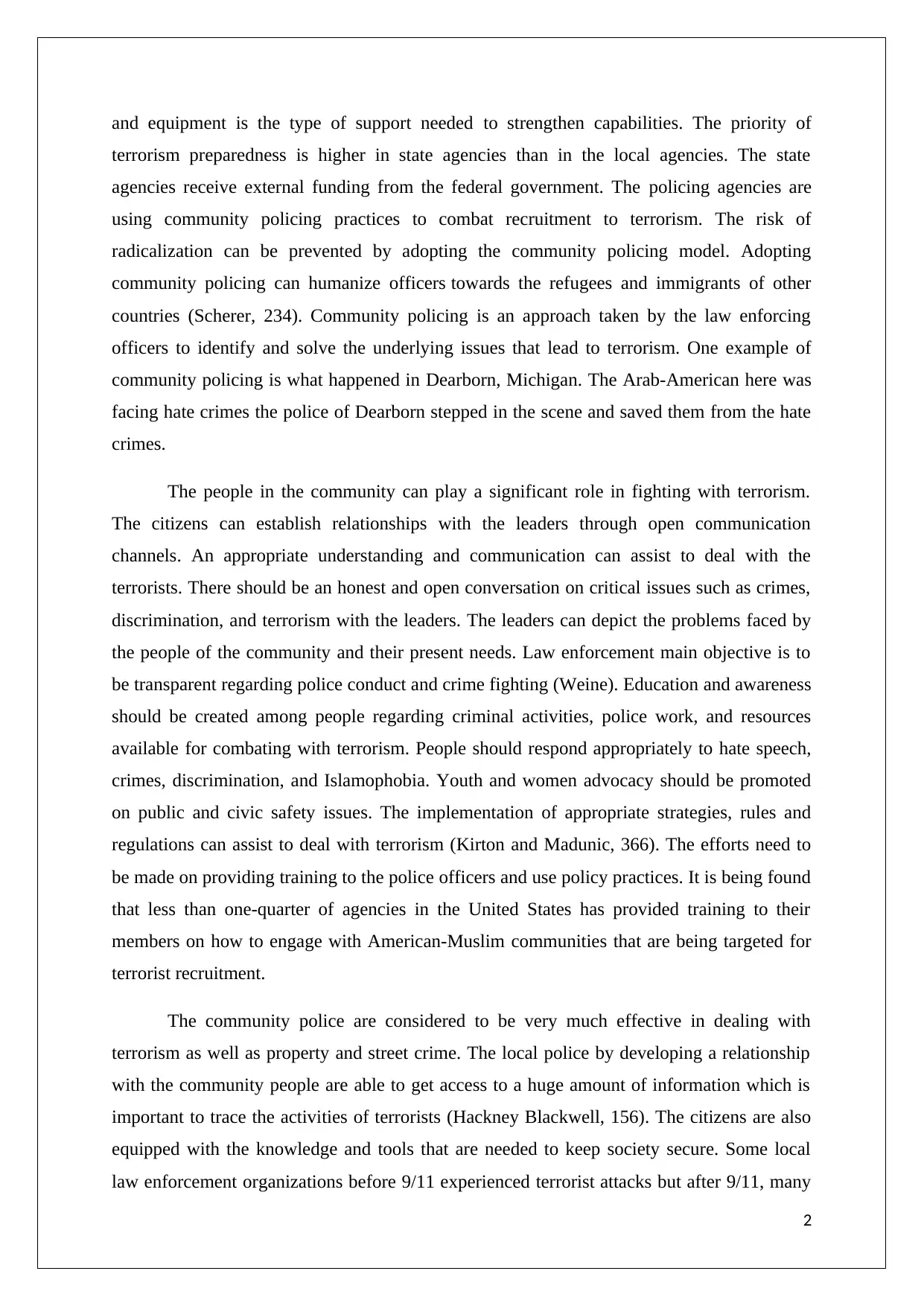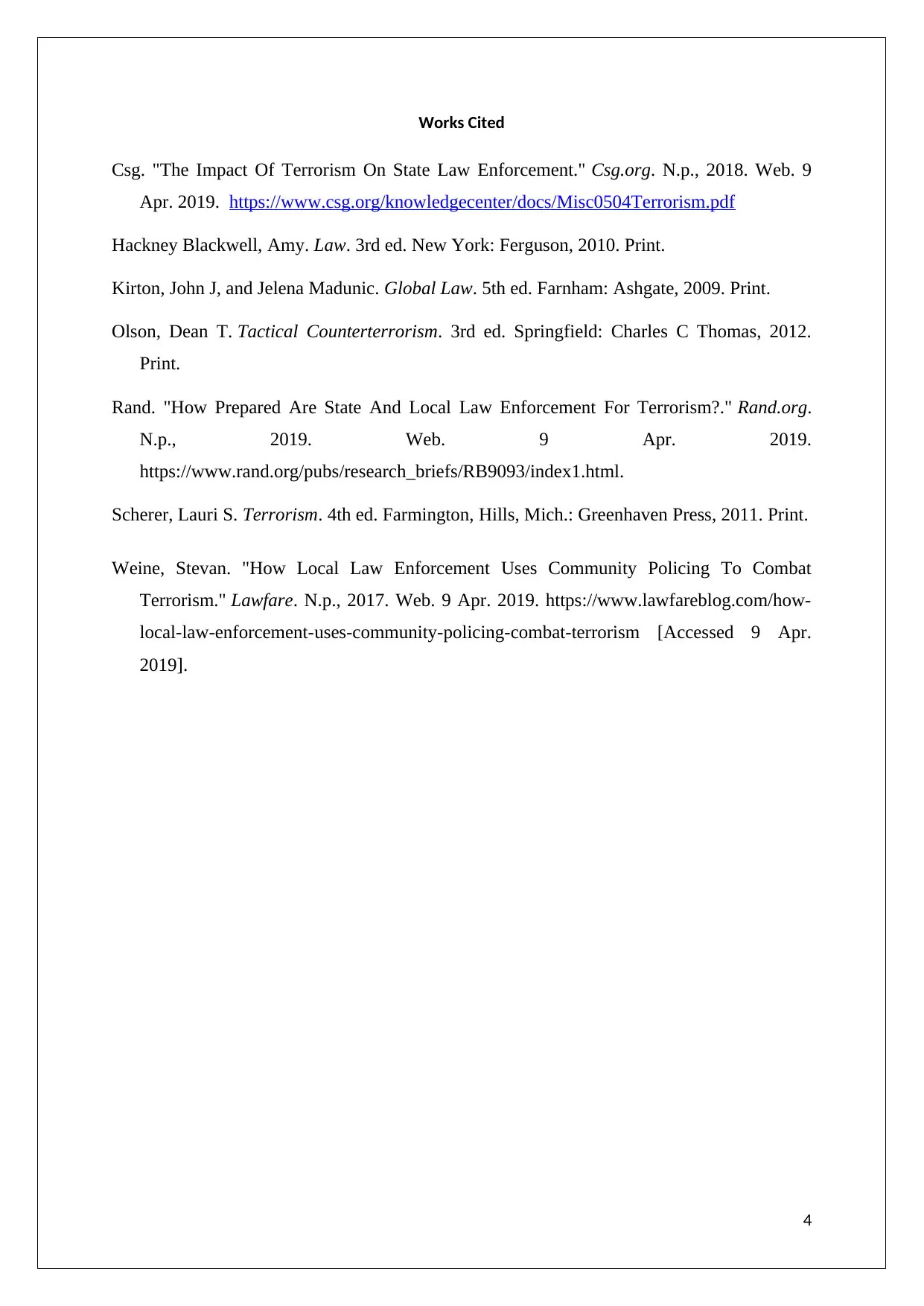Analysis of Terrorism and Local Law Enforcement in the United States
VerifiedAdded on 2023/01/18
|5
|1228
|62
Report
AI Summary
This report analyzes the multifaceted relationship between terrorism and local law enforcement, particularly in the context of the post-9/11 era. It explores how local and state agencies have adapted their strategies to combat both domestic and international terrorism, emphasizing the role of the Department of Homeland Security and the Office of State and Local Governments Preparedness and Cooperation. The report highlights the significance of community policing, citing examples like Dearborn, Michigan, and emphasizes the importance of public education, awareness, and open communication channels between citizens and law enforcement. It examines the shift in risk assessment practices, the need for training and equipment, and the increasing involvement of local agencies in emergency response and counterterrorism efforts. The conclusion underscores the crucial role of local law enforcement in coordinating strategies with federal agencies to ensure community safety and security.

Student Name
University Name
Criminal Justice
University Name
Criminal Justice
Paraphrase This Document
Need a fresh take? Get an instant paraphrase of this document with our AI Paraphraser

Terrorism and Local Law Enforcement
Terrorism is the unlawful use of violence or threat against civilians to coerce the
government to achieve political, religious or ideological aims. Violence during peacetime is
mainly referred to as terrorism. After the 2001 attack, law enforcement has worked more
effectively to develop new strategies to combat terrorism. The local and state Anti-Terrorism
training mainly focus on the preventing terrorism in the United States. The programme
provides necessary tools for the enforcement officers that enable them to detect and deter the
acts of terrorism and violent criminal activities in the United States (Olson, 176). The
programme fights against both domestic and international terrorism. The government has
taken initiatives for providing protection to the people of the community.
Main context
After the terrorist attack of 9\11 in the United States, the United States Department of
homeland security was established. The United States Department of homeland security was
formed in order to prevent future terrorist attacks on the United States. The Office of State
and Local Governments Preparedness and Cooperation within the department of homeland
security work along with state and local law enforcing agencies to combat terrorism. The
Office of State and Local Governments Preparedness and Cooperation also measures
programmatic performance and domestic preparedness (Csg). The Office of State and Local
Governments Preparedness and Cooperation and department of homeland security collect
information regarding the working of the emergency and first responders in meeting new
terrorism-related challenges. Before the formation of the department of homeland security,
the RAND Corporation conducted a survey on the state law enforcement agencies to gather
information regarding their experiences with terrorism.
A survey was conducted focusing on the risk factor, jurisdiction, preparedness
activities, and funding. The local and state law enforcing agencies have taken numerous steps
to combat terrorism. They are increasing the number of personnel that is required for
emergency response framework, updating plans for biological, chemical or radiological
attacks, mutual aid agreement and reallocating departmental spending on terrorism
preparedness. The 9\11 terror attack has increased local level assessment activities (Rand).
Prior to the take, only a few countries use to conduct risk assessment but after the attack, the
scenario has completely changed. Local agencies in large countries are more actively
engaged in planning and training activities than local agencies in small countries. Training
1
Terrorism is the unlawful use of violence or threat against civilians to coerce the
government to achieve political, religious or ideological aims. Violence during peacetime is
mainly referred to as terrorism. After the 2001 attack, law enforcement has worked more
effectively to develop new strategies to combat terrorism. The local and state Anti-Terrorism
training mainly focus on the preventing terrorism in the United States. The programme
provides necessary tools for the enforcement officers that enable them to detect and deter the
acts of terrorism and violent criminal activities in the United States (Olson, 176). The
programme fights against both domestic and international terrorism. The government has
taken initiatives for providing protection to the people of the community.
Main context
After the terrorist attack of 9\11 in the United States, the United States Department of
homeland security was established. The United States Department of homeland security was
formed in order to prevent future terrorist attacks on the United States. The Office of State
and Local Governments Preparedness and Cooperation within the department of homeland
security work along with state and local law enforcing agencies to combat terrorism. The
Office of State and Local Governments Preparedness and Cooperation also measures
programmatic performance and domestic preparedness (Csg). The Office of State and Local
Governments Preparedness and Cooperation and department of homeland security collect
information regarding the working of the emergency and first responders in meeting new
terrorism-related challenges. Before the formation of the department of homeland security,
the RAND Corporation conducted a survey on the state law enforcement agencies to gather
information regarding their experiences with terrorism.
A survey was conducted focusing on the risk factor, jurisdiction, preparedness
activities, and funding. The local and state law enforcing agencies have taken numerous steps
to combat terrorism. They are increasing the number of personnel that is required for
emergency response framework, updating plans for biological, chemical or radiological
attacks, mutual aid agreement and reallocating departmental spending on terrorism
preparedness. The 9\11 terror attack has increased local level assessment activities (Rand).
Prior to the take, only a few countries use to conduct risk assessment but after the attack, the
scenario has completely changed. Local agencies in large countries are more actively
engaged in planning and training activities than local agencies in small countries. Training
1

and equipment is the type of support needed to strengthen capabilities. The priority of
terrorism preparedness is higher in state agencies than in the local agencies. The state
agencies receive external funding from the federal government. The policing agencies are
using community policing practices to combat recruitment to terrorism. The risk of
radicalization can be prevented by adopting the community policing model. Adopting
community policing can humanize officers towards the refugees and immigrants of other
countries (Scherer, 234). Community policing is an approach taken by the law enforcing
officers to identify and solve the underlying issues that lead to terrorism. One example of
community policing is what happened in Dearborn, Michigan. The Arab-American here was
facing hate crimes the police of Dearborn stepped in the scene and saved them from the hate
crimes.
The people in the community can play a significant role in fighting with terrorism.
The citizens can establish relationships with the leaders through open communication
channels. An appropriate understanding and communication can assist to deal with the
terrorists. There should be an honest and open conversation on critical issues such as crimes,
discrimination, and terrorism with the leaders. The leaders can depict the problems faced by
the people of the community and their present needs. Law enforcement main objective is to
be transparent regarding police conduct and crime fighting (Weine). Education and awareness
should be created among people regarding criminal activities, police work, and resources
available for combating with terrorism. People should respond appropriately to hate speech,
crimes, discrimination, and Islamophobia. Youth and women advocacy should be promoted
on public and civic safety issues. The implementation of appropriate strategies, rules and
regulations can assist to deal with terrorism (Kirton and Madunic, 366). The efforts need to
be made on providing training to the police officers and use policy practices. It is being found
that less than one-quarter of agencies in the United States has provided training to their
members on how to engage with American-Muslim communities that are being targeted for
terrorist recruitment.
The community police are considered to be very much effective in dealing with
terrorism as well as property and street crime. The local police by developing a relationship
with the community people are able to get access to a huge amount of information which is
important to trace the activities of terrorists (Hackney Blackwell, 156). The citizens are also
equipped with the knowledge and tools that are needed to keep society secure. Some local
law enforcement organizations before 9/11 experienced terrorist attacks but after 9/11, many
2
terrorism preparedness is higher in state agencies than in the local agencies. The state
agencies receive external funding from the federal government. The policing agencies are
using community policing practices to combat recruitment to terrorism. The risk of
radicalization can be prevented by adopting the community policing model. Adopting
community policing can humanize officers towards the refugees and immigrants of other
countries (Scherer, 234). Community policing is an approach taken by the law enforcing
officers to identify and solve the underlying issues that lead to terrorism. One example of
community policing is what happened in Dearborn, Michigan. The Arab-American here was
facing hate crimes the police of Dearborn stepped in the scene and saved them from the hate
crimes.
The people in the community can play a significant role in fighting with terrorism.
The citizens can establish relationships with the leaders through open communication
channels. An appropriate understanding and communication can assist to deal with the
terrorists. There should be an honest and open conversation on critical issues such as crimes,
discrimination, and terrorism with the leaders. The leaders can depict the problems faced by
the people of the community and their present needs. Law enforcement main objective is to
be transparent regarding police conduct and crime fighting (Weine). Education and awareness
should be created among people regarding criminal activities, police work, and resources
available for combating with terrorism. People should respond appropriately to hate speech,
crimes, discrimination, and Islamophobia. Youth and women advocacy should be promoted
on public and civic safety issues. The implementation of appropriate strategies, rules and
regulations can assist to deal with terrorism (Kirton and Madunic, 366). The efforts need to
be made on providing training to the police officers and use policy practices. It is being found
that less than one-quarter of agencies in the United States has provided training to their
members on how to engage with American-Muslim communities that are being targeted for
terrorist recruitment.
The community police are considered to be very much effective in dealing with
terrorism as well as property and street crime. The local police by developing a relationship
with the community people are able to get access to a huge amount of information which is
important to trace the activities of terrorists (Hackney Blackwell, 156). The citizens are also
equipped with the knowledge and tools that are needed to keep society secure. Some local
law enforcement organizations before 9/11 experienced terrorist attacks but after 9/11, many
2
⊘ This is a preview!⊘
Do you want full access?
Subscribe today to unlock all pages.

Trusted by 1+ million students worldwide

local and state agencies are now involved to deal with terrorism. The agencies took a number
of steps such as an increase in the number of people engaged in the emergency response
programs, updated response plans for radiological, biological or chemical attacks, increase
departmental spending and reallocating the internal resources.
Conclusion
Law enforcement is working closely with federal agencies in order to coordinate
strategies to respond and prevent terrorism. The security and safety of a country depend in
large part on the women and men serving their society all across the nation. The main of the
terrorists, in general, is to impose a significant impact on a particular local area. Thus, local
law enforcement is considered to be the most important aspect of the community which
ensures the protection of the people.
3
of steps such as an increase in the number of people engaged in the emergency response
programs, updated response plans for radiological, biological or chemical attacks, increase
departmental spending and reallocating the internal resources.
Conclusion
Law enforcement is working closely with federal agencies in order to coordinate
strategies to respond and prevent terrorism. The security and safety of a country depend in
large part on the women and men serving their society all across the nation. The main of the
terrorists, in general, is to impose a significant impact on a particular local area. Thus, local
law enforcement is considered to be the most important aspect of the community which
ensures the protection of the people.
3
Paraphrase This Document
Need a fresh take? Get an instant paraphrase of this document with our AI Paraphraser

Works Cited
Csg. "The Impact Of Terrorism On State Law Enforcement." Csg.org. N.p., 2018. Web. 9
Apr. 2019. https://www.csg.org/knowledgecenter/docs/Misc0504Terrorism.pdf
Hackney Blackwell, Amy. Law. 3rd ed. New York: Ferguson, 2010. Print.
Kirton, John J, and Jelena Madunic. Global Law. 5th ed. Farnham: Ashgate, 2009. Print.
Olson, Dean T. Tactical Counterterrorism. 3rd ed. Springfield: Charles C Thomas, 2012.
Print.
Rand. "How Prepared Are State And Local Law Enforcement For Terrorism?." Rand.org.
N.p., 2019. Web. 9 Apr. 2019.
https://www.rand.org/pubs/research_briefs/RB9093/index1.html.
Scherer, Lauri S. Terrorism. 4th ed. Farmington, Hills, Mich.: Greenhaven Press, 2011. Print.
Weine, Stevan. "How Local Law Enforcement Uses Community Policing To Combat
Terrorism." Lawfare. N.p., 2017. Web. 9 Apr. 2019. https://www.lawfareblog.com/how-
local-law-enforcement-uses-community-policing-combat-terrorism [Accessed 9 Apr.
2019].
4
Csg. "The Impact Of Terrorism On State Law Enforcement." Csg.org. N.p., 2018. Web. 9
Apr. 2019. https://www.csg.org/knowledgecenter/docs/Misc0504Terrorism.pdf
Hackney Blackwell, Amy. Law. 3rd ed. New York: Ferguson, 2010. Print.
Kirton, John J, and Jelena Madunic. Global Law. 5th ed. Farnham: Ashgate, 2009. Print.
Olson, Dean T. Tactical Counterterrorism. 3rd ed. Springfield: Charles C Thomas, 2012.
Print.
Rand. "How Prepared Are State And Local Law Enforcement For Terrorism?." Rand.org.
N.p., 2019. Web. 9 Apr. 2019.
https://www.rand.org/pubs/research_briefs/RB9093/index1.html.
Scherer, Lauri S. Terrorism. 4th ed. Farmington, Hills, Mich.: Greenhaven Press, 2011. Print.
Weine, Stevan. "How Local Law Enforcement Uses Community Policing To Combat
Terrorism." Lawfare. N.p., 2017. Web. 9 Apr. 2019. https://www.lawfareblog.com/how-
local-law-enforcement-uses-community-policing-combat-terrorism [Accessed 9 Apr.
2019].
4
1 out of 5
Related Documents
Your All-in-One AI-Powered Toolkit for Academic Success.
+13062052269
info@desklib.com
Available 24*7 on WhatsApp / Email
![[object Object]](/_next/static/media/star-bottom.7253800d.svg)
Unlock your academic potential
Copyright © 2020–2026 A2Z Services. All Rights Reserved. Developed and managed by ZUCOL.




